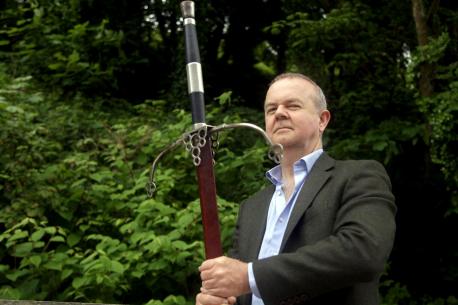BBC channels One and Two currently present such different sides of Ian Hislop that his appearances should by now be required watching for trainee psychologists. As a founding team captain on Have I Got News For You, his knuckles have left a lasting impression on panellists including Jimmy Savile, Piers Morgan and Neil Hamilton; but switch over to one of his documentaries, which have graced all of the more thoughtful channels, and we find a wryly avuncular character. Sometimes he’s even cosy, and that’s something a satirist never should.
During two and a half decades ensuring HIGNFY remains buoyant in the Friday night ratings, he has undoubtedly paid his televisual dues, and has been allowed to make the kind of programme that certainly won’t be challenging Strictly in the ratings. We’ve had his explorations of Baden-Powell, Beeching, and banking philanthropists, among others: all respectfully received, but equally, missing the polemical edge one might expect from such a redoubtable campaigning journalist.
Tonight’s programme could have been one of his more topical. The apparent drift of “Olden Days: the Power of the Past” (why did a journalist of his acuity let the BBC get away with this fog of a title?) was an incisive critique of Britain’s obsession with the past. (As so often, where “Britain” is cited, we never properly left England.) Cue, perhaps, a broadside against Faragiste 1950s nostalgia, or Cameron’s Big Society?
Perhaps the next generation, with the benefit of Michael Gove’s new British curriculum, will have the Dark Ages at its fingertips
Instead, we headed back to the Dark Ages. And for most of the programme, we stayed there, as Hislop examined the sly and expedient manner in which Kings Alfred and Arthur have been appropriated by all manner of political notables. There were some fascinating examples. The Fellows of University College, Oxford invented a connection with King Alfred to prevail with Richard II in a land dispute; while Henry VIII recreated Arthur in his own image to impress the Holy Roman Emperor.
Surely, though, there’s some context missing. Henry VIII was, rightly or wrongly, taking England in a revolutionary new direction, as she abandoned Catholicism after a millennium in the Roman See. He needed some historical foundations for his task; Britain today is, in her official profile at least, all historical foundation and no superstructure. Eventually, in the last ten minutes, the contemporary perspective arrived. Hislop’s argument would, however, have been more vivid had he explored the contemporary connections from the start, with a clearer, stronger introduction.
 “Everybody knows…” Hislop said several times, referring to the assumed common knowledge of the Alfred and Arthur stories, with their quaint details about stones and burnt cakes. They didn’t feature in my 1980s primary education, and I strongly suspect, haven’t since. Perhaps the next generation, with the benefit of Michael Gove’s new British curriculum, will have the Dark Ages at its fingertips; or perhaps we just have to start explaining this history more directly.
“Everybody knows…” Hislop said several times, referring to the assumed common knowledge of the Alfred and Arthur stories, with their quaint details about stones and burnt cakes. They didn’t feature in my 1980s primary education, and I strongly suspect, haven’t since. Perhaps the next generation, with the benefit of Michael Gove’s new British curriculum, will have the Dark Ages at its fingertips; or perhaps we just have to start explaining this history more directly.
He’s a skilful presenter, and the programme is nicely made, with cute little animations (reminiscent of HIGNFY’s opening credits) and a judicious crop of expert talking heads. But for much of today’s audience, celebrity cakes belong to Mary Berry, not King Alfred. Hislop has both the credibility and intelligence to make this history matter, but it would need a much more forceful display than this.















Add comment